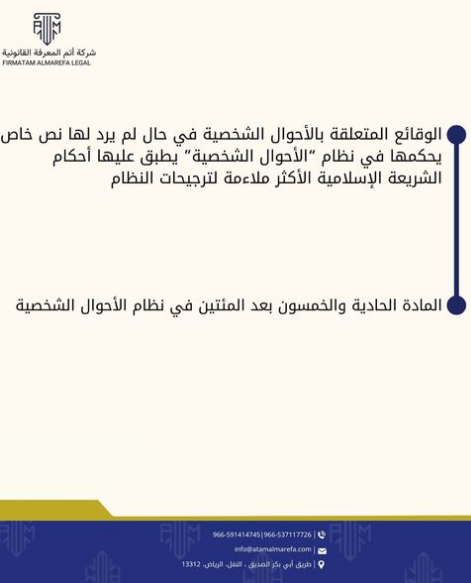Misdemeanors are considered one of the crimes of great importance in legal systems worldwide, including Saudi law, where criminal law defines misdemeanors as crimes that range in severity from minor offenses to major crimes or felonies. These crimes include a group of acts that are considered a threat to public order or negatively affect the rights of individuals. In the Saudi legal system, misdemeanors are characterized as less serious than felonies, and therefore the penalties associated with them are less severe. This article will address the definition of misdemeanors in Saudi law and the prescribed penalties.

Facts related to personal status in the absence of a special provision governing them in the Personal Status Law, the provisions of Islamic law that are most appropriate to the system’s weighting shall be applied.
The two hundred and fifty-first article in the Personal Sta
Definition of misdemeanors in Saudi law
Saudi law defines misdemeanors as acts that are considered moderately serious crimes, as these acts include a range of illegal behaviors that may harm the public interest or individuals without being classified as serious crimes or felonies. Examples of misdemeanors include simple theft, verbal assault, insults, slander, and some traffic violations These crimes are lighter compared to felonies, but they still pose a threat to social order and individual rights.
Types of misdemeanors
Misdemeanors include a group of crimes that are classified according to their nature and include many illegal acts such as slander, insults, assaulting others, and property-related crimes such as smuggling and commercial fraud. Misdemeanors also include economic crimes that relate to circumventing financial and tax systems, which affects the national economy, and the penalties associated with these crimes vary according to their nature and circumstances and may range from financial fines or imprisonment for specific periods or even deprivation of civil rights.
Penalties for misdemeanors
Penalties for misdemeanors are determined by the laws and regulations in force in the Kingdom, where penalties are imposed by the competent courts. Penalties vary depending on the type of crime and its circumstances. Penalties may include short-term imprisonment, financial fines, or both, with the possibility of applying additional penalties such as depriving the exercise of some civil or professional rights in case the crime is related to the exercise of commercial or professional activities. This aims to deter individuals from committing such acts and enhances security and social stability.
Classification of misdemeanors
Misdemeanors can be classified into several categories according to their nature and severity:
Minor misdemeanors are considered less serious and are punishable by light penalties such as fines or short-term imprisonment.
Moderate misdemeanors are more serious and may require more severe penalties such as medium-term imprisonment or large fines.
Aggravated misdemeanors are considered to have a greater impact on society and may be punished with more severe penalties such as longer prison terms and fines.
Penalties for misdemeanors
The penalties associated with misdemeanors in Saudi law vary according to the nature and circumstances of the offense.
Imprisonment for periods ranging from several months to several years, depending on the seriousness and frequency of the crime, where the duration of imprisonment is estimated according to the nature and circumstances of the crime.
Financial fines may be imposed on the offender as an additional punishment to imprisonment, as fines are considered an effective means of achieving public deterrence and justice.
Social work that the offender may be required to perform as part of the punishment, as these works aim to rehabilitate the offender and reform his behavior.
The penalties associated with misdemeanors vary depending on who committed the crime and whether they have a criminal record as these factors can influence the court’s decision on the appropriate punishment.
Offender and victim rights
The legal systems in Saudi Arabia give great importance to the rights of both the offender and the victim, as the offender is considered entitled to a fair trial and guarantees his legal rights, including the right to defense and legal representation, while the victim is given the right to file a complaint, appear in court, and express the impact of the crime on his life, and these rights are considered an essential part of the legal system that seeks to achieve justice and equality between individuals.
The role of judicial authorities in applying penalties
Judicial authorities apply penalties associated with misdemeanors in line with applicable laws. The role of the judiciary is to consider cases related to misdemeanors, evaluate evidence and testimonies, and determine appropriate penalties according to legal standards, and the executive authorities work to apply these penalties through the rulings issued by the courts, which contributes to strengthening the legal system and protecting the rights of individuals and society.
Legal implications of misdemeanors
Misdemeanors lead to multiple legal and social effects, as the penalties imposed can affect the lives of individuals and may lead to the loss of jobs or prestigious social status. These crimes are also considered a violation of values and morals in society, which requires strengthening legal and social awareness to reduce these phenomena and promote a safe and stable legal environment, and the concerned authorities focus on awareness and rehabilitation programs for individuals who commit misdemeanors to reduce crime rates and achieve integration between the rights and duties of individuals in society.
Conclusion
Misdemeanors are an integral part of the criminal system in the Kingdom of Saudi Arabia, as they express illegal acts that pose a threat to social order and affect the rights of individuals. The definition of misdemeanors and associated penalties reflect the balance between protecting society and ensuring the rights of individuals by applying appropriate penalties to achieve justice. Saudi law aims to achieve social security and ensure the stability of society by addressing crimes and achieving deterrence, and penalties associated with misdemeanors contribute to the rehabilitation of offenders and encourage them to stay away from committing crimes in the future, which contributes to the promotion of social peace and the stability of the community.
